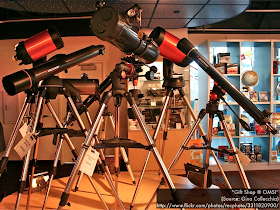Cuesta College, San Luis Obispo, CA
Students have a weekly online reading assignment (hosted by SurveyMonkey.com), where they answer questions based on reading their textbook, material covered in previous lectures, opinion questions, and/or asking (anonymous) questions or making (anonymous) comments. Full credit is given for completing the online reading assignment before next week's lecture, regardless if whether their answers are correct/incorrect. Selected results/questions/comments are addressed by the instructor at the start of the following lecture.
The following questions were asked on reading textbook chapters and previewing presentations on reviewing the history of astronomy, Kepler's and Newton's laws, and telescope powers.

Selected/edited responses are given below.
Describe something you found interesting from the assigned textbook reading or presentation preview, and explain why this was personally interesting for you.
"Kepler's second law--it's odd to visualize the revolution along an ellipse around a dot in terms of the area that make each 'slice' equal in terms of both the speed it takes the planet to sweep through and the area of each slice."
"Newton's cannon--because if it was possible to be built, we could send a projectile into orbit around the Earth but sadly its atmosphere would simply drag it down making it impossible to do so."
"Telescopes--because they are similar to microscopes, which I use on a daily basis in my job. We use slit lamp microscopes in ophthalmology, very similar to telescopes in a way.
"How these scientists followed their curiosity, rather than the prevailing beliefs, which led to them discovering great things."
Describe something you found confusing from the assigned textbook reading or presentation preview, and explain why this was personally confusing for you.
"Kepler and Newton's Laws... they all seem so very similar. I got confused as to which law means what. Also, retrograde and prograde motion, and the direction a planet moves with respect to the stars."
"I found Newton's cannon to be slightly confusing, along with the importance of it."
"I'm pretty much just confused in general at this point."
"I'm sure I have just overcomplicated it in my head, but the whole idea of how telescopes work is extremely confusing."
"More instruction on how to locate planets and figure out where Earth is just from looking at a diagram."
"Telescope powers. I didn't know telescopes used mirrors. Also the magnifying powers and resolving powers. All were confusing."
When a planet is undergoing retrograde motion, over several nights it moves __________ with respect to the background stars.
east to west. *********** [11] west to east. ** [2] (Either of the above choices is possible.) ********* [9] (Unsure/lost/guessing/help!) ***** [5]
When a planet is undergoing prograde motion, over several nights it moves __________ with respect to the background stars.
east to west. ***** [5] west to east. ********** [10] (Either of the above choices is possible.) ****** [6] (Unsure/lost/guessing/help!) ****** [6]
Categorize each of Kepler's laws.
(Only correct responses shown.)
Kepler's first law: describes the shape of a planet's orbit. [74%]
Kepler's second law: describes the motion of a planet along its orbit. [59%]
Kepler's third law: describes the motion of a planet along its orbit. [67%]
Categorize each of Newton's laws.
(Only correct responses shown.)
Newton's first law: relates forces with changes in motion. [56%]
Newton's second law: relates forces with changes in motion. [63%]
Newton's third law: describes a property of forces. [56%]
The __________ power of a telescope depends on the: (Only correct responses shown.)
light-gathering: diameter of the primary lens/mirror [63%]
resolving: diameter of the primary lens/mirror [37%]
magnifying: both the focal lengths of the primary lens/mirror and eyepiece: [22%]
The least important feature to consider when purchasing an optical telescope is the __________ of its images.
brightness. *** [3] resolution. ** [2] magnification. **************** [16] (Two of the above choices.) [0] (Unsure/lost/guessing/help!) ***** [6]
Briefly explain your answer for the least important feature to consider when purchasing an optical telescope.
"Magnification: essentially useless without strong lightgathering power and resolving power. Resolution does not increase with zoom."
"Magnification simply enlarges the image, it doesn't improve the quality of the image."
"Higher magnifying power doesn't necessarily mean more detail, because the amount of detail is limited by seeing conditions and resolving power."
"Maybe it's the cold medicine I'm taking right now, but I'm just lost."
Ask the instructor an anonymous question, or make a comment. Selected questions/comments may be discussed in class.
"This history of astronomy is really cool! I am fascinated by what these people learn; each time it brings us closer and closer to the truth of how our solar system works."
"Star Wars or Star Trek? Or both?" (Definitely this. #jedihandwave #mayyoulivelongandprosper)
"Marvel or DC?" (Not going there. Nuh-uh.)
"Will we ever take a field trip to a huge telescope?" (Yes, we'll take a field trip out to the North County campus telescope shelter this Thursday during class, and again that night, and you'll get to see the telescopes up close, as well as look through them at night (well, weather permitting).)
"Still haven't received my textbook yet. I rented it off Amazon, and they're taking their sweet time to ship it. It should be here by the end of the week, though."
No comments:
Post a Comment